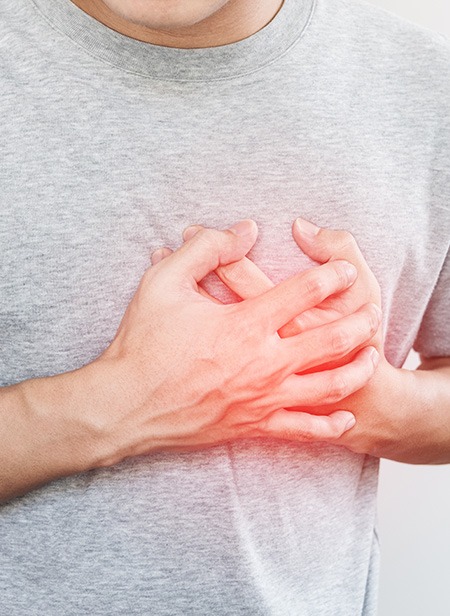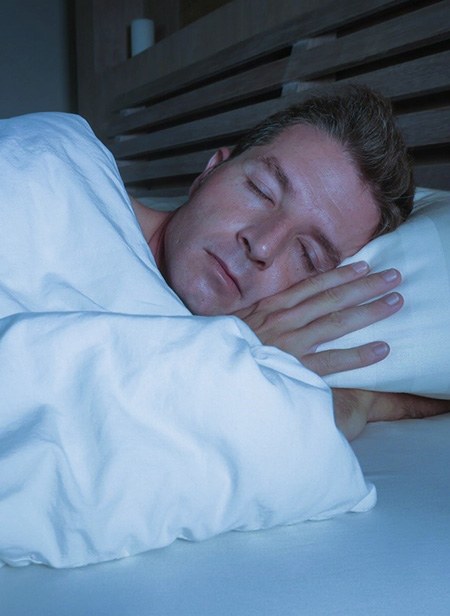
Sleep Apnea Treatment – Manchester, NH
Take Back Your Good Night’s Sleep
Tens of millions of Americans suffer from sleep apnea, a chronic condition that makes it nearly impossible to get consistent sleep throughout the night. If you or a loved one happens to snore loudly as they sleep or wakes up often gasping for air, it may be due to this disorder. Thankfully, our Manchester, NH, dental team can help you take back your good night’s sleep via custom oral appliance therapy. Continue reading below to learn more about this life-changing service.
Why Choose Webster Dental Associates of Manchester for Sleep Apnea Treatment?
- Highly Customized Oral Appliance Therapy
- Dedicated Dentists Who Listen to Your Needs
- Modern Dental Office with Advanced Technology
What Is Sleep Apnea?

Sleep apnea is the name of a disorder that occurs when a person experiences multiple pauses in breathing, or episodes of reduced breathing, during sleep. These incidents, known as apneas, can occur hundreds of times in a single night. They disrupt the sleep cycle and can be damaging to your daily quality of life and overall health.
You might be a victim of sleep apnea if:
- You are often exhausted despite sleeping for 7 – 8 hours.
- You frequently wake up with a headache or sore throat.
- Your partner has observed that you sometimes stop breathing during sleep.
- You snore loudly and frequently.
The Dangers of Sleep Apnea

On the surface, sleep apnea might seem like nothing more than an annoyance. However, if it remains untreated for too long, it can lead to some serious consequences:
- Poor health. OSA is associated with a heightened risk of heart attack, stroke, diabetes, and other devastating health issues.
- Decreased quality of life. Tiredness can cause irritability and a lack of energy, both of which could adversely affect your relationships with others, your performance at work, and other aspects of your daily life.
- Higher risk of accidents. Slowed reaction times can increase the chances that you will be involved in a car crash or another type of accident.
Sleep Apnea Treatment Options

The most common way to treat sleep apnea is with a CPAP machine, which uses pressurized air to prevent pauses in breathing. Unfortunately, many people find that their machine is uncomfortable and inconvenient.
At Webster Dental Associates, we offer a popular alternative to CPAP therapy. To remove airway blockages, we create a custom-made oral appliance that is worn as you sleep. This appliance shifts the position of the tongue and moves the jaw forward, creating more space for air to travel as you inhale and exhale. Oral appliance therapy has a higher compliance rate than CPAP machines due to its comfort and ease of use.
Sleep Apnea (Obstructive Sleep Apnea) FAQs
Can I Diagnose Sleep Apnea on My Own?
It’s important to keep in mind that sleep apnea symptoms don’t automatically mean you actually have sleep apnea. Researchers are still working to understand this condition better, and many of the markers are also common symptoms for other issues. For instance, frequent bouts of insomnia could indicate a case of sleep apnea – or anxiety, or depression, etc. The only way to know for sure is to get a sleep test from a qualified professional!
What Does Sleep Apnea Look Like for Women?
Those assigned female at birth are less likely to snore than their male counterparts, although significant hormonal shifts like those found during pregnancy or menopause might trigger flare-ups. Hormone changes can also increase the likelihood of experiencing restless leg syndrome for women with sleep apnea. Insomnia, anxiety, depression, and frequently needing to use the bathroom at night also seem to be more common symptoms for women, which can contribute to a late or misdiagnosis.
While only a qualified doctor can officially diagnose sleep apnea, if you suspect this condition is the root cause of your symptoms, we’d be happy to perform a screening. Unfortunately, women are more likely to go undiagnosed, but the more data you have, the more you build up your case!
Can Children Have Sleep Apnea?
Yes – in fact, about 1% to 8% of children struggle with sleep apnea. Their symptoms just look a little different! In addition to being irritable, children might also have trouble paying attention or retaining information. Contrary to what you might assume, they can also become hyperactive during the day or as bedtime draws closer. Finally, a child with sleep apnea might experience other sleep issues, such as bed-wetting or night terrors.
When your child’s behavior seems strange or they complain about odd symptoms, it’s worth observing how well they’re resting at night. If their breathing seems to be periodically interrupted, sleep apnea is a good suspect!
How Can I Travel with Sleep Apnea?
Our oral appliances are easy to take on-the-go! Simply store it in its case and be sure to pack it where you can easily reach it. CPAP machines, in contrast, are more difficult to travel with; they might not be on the TSA ban list, but they’re not likely to fit in a carry-on bag!
Something to be mindful about while you’re travelling is your sleep hygiene. Stick as close as possible, and you’ll increase your chances of getting a good night’s rest.